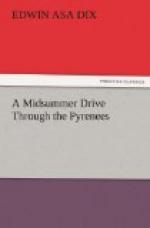Froissart liked to write, “and it was very tiresome,” he remarks, “to me to be idle, for I well know that when the time shall come when I shall be dead and rotten, this grand and noble history will be in much fashion and all noble and valiant persons will take pleasure in it and gain from it augmentation of profit.” So, seeking fresh chapters, he had come to Orthez, where he was at once handsomely received by Count Gaston at this Castle of Moncade. Here he remained through the winter, affable and inquiring and observant, adding many pages to his history,—which, his host assured him, would in times to come be more sought after than any other; “‘because,’ added he, ’my fair sir, more gallant deeds of arms have been performed within these last fifty years, and more wonderful things have happened, than for three hundred years before. ’”
“The style of Froissart,” says Taine, who has so marvelously divined the inner spirit of those times, “artless as it is, deceives us. We think we are listening to the pretty garrulousness of a child at play; beneath this prattle we must distinguish the rude voice of the combatants, bear-hunters and hunters of men too, and the broad, coarse hospitality of feudal manners. At midnight the Count of Foix came to supper in the great hall. ’Before him went twelve lighted torches, borne by twelve valets; and the same twelve torches were held before his table and gave much light unto the hall, which was full of knights and squires; and always there were plenty of tables laid out for any person who chose to sup.’ It must have been an astonishing sight to see those furrowed faces and powerful frames, with their furred robes and their justicoats streaked under the wavering flashes of the torches.” And one of Froissart’s characteristic anecdotes is cited, which merits giving even more in full: “On Christmas Day, when the Count de Foix was celebrating the feast with numbers of knights and squires, as is customary, the weather was piercing cold, and the count had dined, with many lords, in the hall. After dinner he rose and went into a gallery, which has a large staircase of twenty-four steps: in this gallery is a chimney where there is a fire kept when the count inhabits it, otherwise not; and the fire is never great, for he does not like it: it is not for want of blocks of wood, for Bearn is covered with wood in plenty to warm him if he had chosen it, but he has accustomed himself to a small fire. When in the gallery, he thought the fire too small, for it was freezing and the weather very sharp, and said to the knights around him: ’Here is but a small fire for this weather.’ The Bourg d’Espaign instantly ran down stairs; for from the windows of the gallery, which looked into the court, he had seen a number of asses laden with billets of wood for the use of the house; and seizing the largest of these asses with his load, threw him over his shoulders and carried him up stairs, pushing through the crowd of knights and squires who were around the chimney, and flung ass and load with his feet upward on the dogs of the hearth, to the delight of the count and the astonishment of all.”




